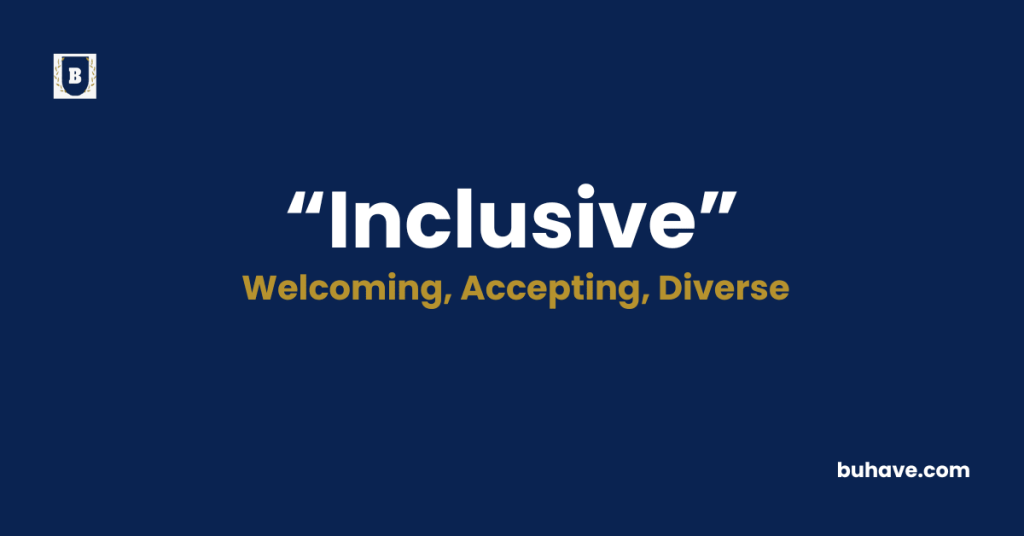The word ‘Inclusive‘ (Adjective) describes something that intentionally includes all people, ensuring that no one is left out due to differences such as race, gender, age, or background. in this guide, you’ll learn the full definition, synonyms, antonyms, etymology, and real-life examples of how to use ‘Inclusive’ correctly in sentences.
Inclusive Explained in Depth
A complete and detailed guide to the words Inclusive including meaning, definition, examples, etymology, synonyms, and antonyms.
Meanings of Inclusive
Inclusive refers to an approach or attitude that welcomes and embraces all people, regardless of their differences. At first, the word was often used to describe practices, policies, or environments that made sure everyone, regardless of background, had a seat at the table. In addition, being inclusive means offering equal opportunities, ensuring that no one feels excluded or left behind. Moreover, inclusivity promotes the idea that diversity enhances the strength and richness of any group, whether in a workplace, community, or society. Eventually, the concept expanded to touch on everything from language to accessibility, as people recognized the importance of creating environments where everyone feels valued.
Today, when something is described as “inclusive,” it highlights the effort to ensure fairness, respect, and participation for all, no matter their race, gender, ability, or beliefs.
Definition:
Inclusive refers to something that intentionally includes all people, ensuring that no one is left out due to differences such as race, gender, age, or background. At first, the word was mostly used to describe policies or environments that actively worked to accommodate and welcome everyone. In addition, being inclusive means providing equal opportunities and fostering a sense of belonging for all individuals, regardless of their unique characteristics.
Moreover, inclusivity emphasizes diversity, recognizing that different perspectives and experiences strengthen communities, workplaces, and societies. Eventually, the concept expanded to touch on broader social practices and values, encouraging acceptance and respect for all. Today, when something is described as “inclusive,” it signifies a commitment to fairness, equality, and respect for everyone, ensuring that no one is marginalized or excluded.
Etymology:
The word “inclusive” traces its origins back to the Latin word “inclusus,” which means “shut in” or “enclosed.” Initially, it comes from the verb “includere,” meaning “to shut in or to contain.” At first, this Latin word referred to something being enclosed or kept within boundaries. However, as the word evolved through Middle English, it shifted to represent the idea of including something within a certain scope, such as embracing all parts of a group or category. In addition, the meaning of “inclusive” began to emphasize the acceptance and integration of everyone, regardless of differences, especially in social and political contexts. Eventually, as the word found its way into modern English usage, “inclusive” grew to symbolize fairness and equal participation.
Today, it describes environments, policies, or practices that actively welcome and accommodate all people, ensuring no one is excluded.
Example Sentence:
- First, the company launched an inclusive hiring policy, ensuring that people of all backgrounds had equal opportunities for employment.
- Moreover, the school’s inclusive environment allows students of all abilities to thrive, supporting each individual’s needs and potential.
- In addition, the conference organizers created an inclusive event by offering accessible accommodations for attendees with disabilities.
- Meanwhile, the community leaders worked hard to foster an inclusive atmosphere where everyone felt welcome and valued, no matter their differences.
- Finally, the nonprofit’s mission is to create an inclusive society, where everyone, regardless of race or gender, has a voice and a chance to succeed.
Inclusive Synonyms:
- All-encompassing
- Embracing
- Comprehensive
- Welcoming
- Broad-minded
- Open
- Unbiased
- Tolerant
- Accepting
- Non-exclusive
Inclusive Antonyms:
- Exclusive
- Restrictive
- Limited
- Narrow
- Discriminatory
- Selective
- Intolerant
- Segregated
- Partial
- Elitist
FAQs about Inclusive
Here’s a FAQ-style guide about the word “Inclusive”
1. What does “inclusive” mean?
“Inclusive” is an adjective that means open to everyone and not excluding any person, group, or idea. It reflects a commitment to diversity, equity, and belonging.
2. How is “inclusive” used in a sentence?
- “We strive to create an inclusive workplace where everyone feels valued.”
- “The event was inclusive of all ages and abilities.”
- “She uses inclusive language in her writing.”
3. What are some synonyms for “inclusive”?
- Welcoming
- Open-minded
- Accepting
- All-encompassing
- Comprehensive
- Equitable (in some contexts)
Each synonym emphasizes different aspects of inclusion and fairness.
4. What is the opposite of “inclusive”?
The opposite would be exclusive, which can mean restrictive, limited to certain people, or not open to all.
Example:
- Inclusive: “Open to everyone.”
- Exclusive: “Members only.”
5. Why is inclusivity important?
- Inclusivity fosters:
- Belonging and respect
- Innovation through diverse perspectives
- Equal opportunities
- Positive social and organizational cultures
Whether in schools, companies, or communities, inclusion helps everyone thrive.
6. How is “inclusive” used in professional settings?
- Inclusive leadership: Empowering diverse voices
- Inclusive policies: Supporting equity and access
- Inclusive hiring: Removing bias from recruitment
- Inclusive design: Creating products accessible to all users
7. What does “inclusive language” mean?
Inclusive language avoids bias and respects all identities. It includes:
- Respect for names, pronouns, and identities
- Culturally sensitive communication

















